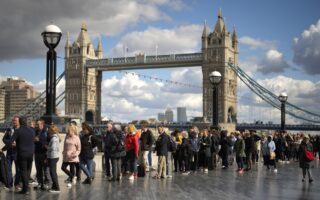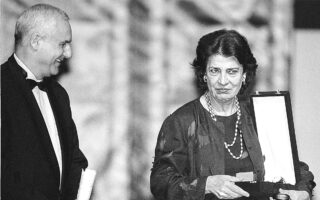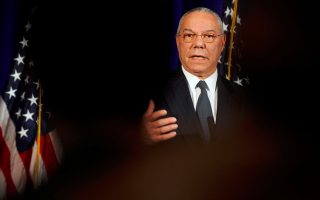The last constant

The long lines of British men, women and children waiting to bid farewell to their queen are truly impressive. I wonder what drives the phenomenon, apart from a British commitment to orderly lines. I have a feeling that it is being driven, in great part, by an enormous sense of anxiety about what they are leaving behind and what lies ahead.
Great Britain was a great empire and even though it lost that status in the wake of World War II, it never lost its luster and, to a degree, its influence. What it lost in real power it gained in soft power thanks to its valiant stance in the war and the emblematic personality of Winston Churchill. The system that was created by the United States after 1945, moreover, allowed countries that were former empires, like Great Britain, to retain their dignity and to continue being important, influential and wealthy, even if they could no longer claim a starring role in the global game of the superpowers. Britain in particular continued to be respected as a leader in the arts and letters, in diplomacy, in intelligence and in entrepreneurial spirit, even though the country was no longer a superpower.
Queen Elizabeth was the thread that – for decades – tied the once glorious past to the more modest present. She stood for stability, tradition, moderation and, of course, a certain sense of greatness that to some degree helped nurture baseless delusions, overshadowing the gray reality with her virtues. The British people went through a lot of trials and tribulations in the last few decades, but she was there, on the throne. She was their constant, absorbing – along with the institution – the shock waves.
Like the rest of the West, Britain has in recent years been thrust into a fresh maelstrom. It suffered from poor leadership and intense polarization within society itself, and the people took decisions that spoke of their frustration and desire for introversion. It took itself out of the European family and can no longer play a significant geopolitical role, despite its persistence on the special relationship with the United States and its dynamic involvement in Ukraine. But no matter how active a role the former superpower seeks in this new cold war, its people know that the present is nothing like the past.
Elizabeth was the last constant. She was the wise leader who may not have been on Twitter but had reach, tradition and history at her side. She was the personification of certainty in the face of rapid developments, ably holding down the dual role of person and institution against an uncertain horizon. She represented the comforting presence of solid institutions and mores. And she was all that at a time when everything that stands out is distorted, torn down and disparaged.
I am certain that Great Britain will find its bearings in this new post-Elizabethan era. For now, though, it mourns the death of its queen and the end of an era. Perhaps it will come closer to us. I got a taste of this potential closeness when I witnessed British friends during the Brexit talks arguing like Greeks.





